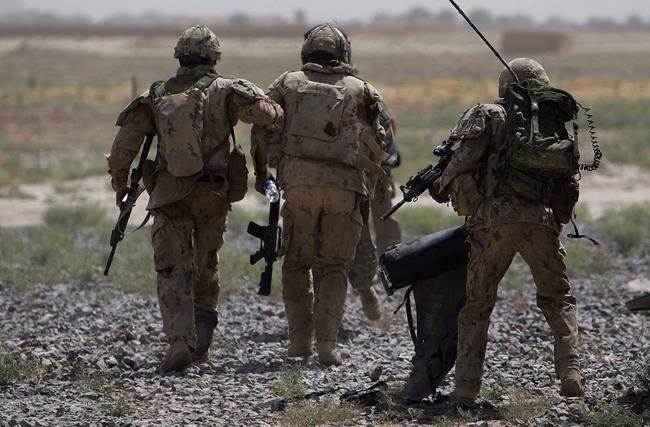
FILE PHOTO - Canadian soldiers help a comrade, center, get on a helicopter after he was injured in an IED blast during a patrol outside Salavat, in the Panjwayi district, southwest of Kandahar, Afghanistan, Monday, June 7, 2010.
Image Credit: THE CANADIAN PRESS/AP/Anja Niedringhaus
November 24, 2016 - 6:00 AM
OTTAWA - The federal government will spare no expense in caring for Canada's military personnel, Defence Minister Harjit Sajjan said Wednesday after a new report revealed 18 service members took their own lives in 2015.
The report, compiled and published by the top medical officer in the Canadian Forces, also concluded that many of the 18 military personnel had sought some type of mental-health treatment shortly before their deaths.
Brig.-Gen. H.C. MacKay's report also found growing indications that army members are more likely to take their lives than those in the navy or air force, as are soldiers who served on missions overseas, such as in Afghanistan.
The issue of military suicide is "a little more personal for me," said Sajjan, himself a veteran of the Afghan combat mission. The same is true for another Afghan vet: Gen. Jonathan Vance, the chief of the defence staff, he added.
"Every time I find out (about a military suicide), it's too much for me," Sajjan said. "So we are seized with this."
The Liberal government is currently drawing up a new defence policy, which will lay out a vision for Canada's military for the next 20 years, touching on issues like equipment, troop numbers and the main security threats the country faces.
But Sajjan said the policy will also pay significant attention to supporting Canada's military personnel, the subject of much debate and criticism in recent years.
Regardless of whatever else is decided, Sajjan said, "the care of troops will be something we will always be sure is properly resourced."
A look at the latest Canadian Forces report on suicides in 2015, by the numbers
Of the 18 members who took their own lives last year, 14 were men who were full-time soldiers, while one was female. The other three were reservists.
Wednesday's report focused on full-time males due to the relatively small number of female and reservist suicides. The 14 suicides mark the third-highest total on record since 1995, exceeded only by 21 in 2011 and 16 in 2014
The report said there have been 239 suicides involving full-time servicemen in the 20 years between 1995 and 2015, and 82 alone between 2010 and 2015.
Nearly two-thirds were suffering from more than one mental health issue, including depression, post-traumatic stress disorder or substance abuse, while more than 75 per cent also had more than one type of problem in their work or family life.
Of the 14, 10 had sought outpatient mental health care at some point — four in the month before their death and eight within the past year. In addition, nine had shown a previous inclination toward suicide, or had already tried at least once to take their own lives.
The Canadian Forces has ramped up mental-health services since a rash of suicides in 2013 forced the issue into the public consciousness. But some have complained that the services are insufficient, particularly for troops who are forced to leave the military for medical reasons.
The ombudsmen for veterans and the Canadian Forces have both called for improvements to ease the transition from military to civilian life for injured veterans.
The report also found is a growing acceptance within military medical circles of a link between military suicides and deployments overseas.
"There is strong evidence that the (military) mission in Afghanistan has had a powerful impact on the mental health of an important minority of personnel who deployed in support of it," reads one section, though it later warns against fixating only on missions.
"Suicide is a multifactorial event that is explained by more than deployment alone," the report said.
"Focusing only on deployment, PTSD or any of the other risk factors discussed in this report is an ineffective approach to suicide prevention."
— Follow @leeberthiaume on Twitter
News from © The Canadian Press, 2016